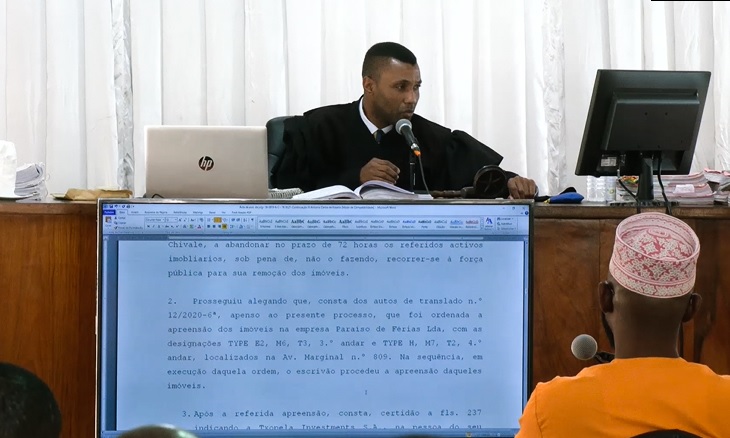Two still missing following terrorist attack in Niassa reserve - AIM report
Hidden debts: Rosário loses his lawyer – AIM report

Photo: O País
Judge Efigenio Baptista, who is presiding over the Maputo trial of 19 people on charges arising from the scandal of Mozambique’s “hidden debts”, on Tuesday ordered lawyer Alexandre Chivale to leave the case, on the grounds of serious conflicts of interest.
Chivale was representing Antonio Carlos do Rosario, the former head of economic intelligence in the Intelligence and Security Service (SISE). At the time of his arrest, in early 2019, Rosario was also chairperson of the board of the three fraudulent companies at the heart of the scandal – Proindicus, Ematum (Mozambique Tuna Company) and MAM (Mozambique Asset Management).
On the first day of the trial, 23 August, prosecuting attorney Sheila Marrengula asked Baptista to take action against Chivale because he is a director of the company Txovela Investments, a company effectively run by Rosario which has close links to the Abu Dhabi based group, Privinvest.
Marrengula argues that Txopela is one of the channels for distributing bribes from Privinvest. After Rosario’s arrest, properties registered in his name were seized, including three central Maputo flats, two offices and a shop – but, much to the prosecution’s annoyance, they were handed over to Txopela Investments, as the “bona fide depositary”, despite Txopela’s close relations with Rosario.
To run Rosario’s property portfolio, Chivale set up another company, Dandula Investments, in which he owns 75 per cent of the shares. He has also taken advantage of the situation to occupy one of the flats (though he claims to own several other houses).
Marrengula demanded that Txopela be sacked as “bona fide depositary”: usually, she pointed out, it was the Department of State Assets in the Ministry of Economy and Finance that acted as the depositary for property seized in criminal investigations. She also urged Baptista to evict Chivale from the flat.
But for almost two months, nothing happened. On Tuesday, Baptista revealed this was because parts of the evidence relating to Rosario’s real estate dealings had gone missing from the case file.
Marrengula had given this alarming news on Monday. She said 34 pages were missing (out of a total of over 17,000 pages) and these were mostly pages dealing with Rosario’s properties, the very issue she wanted to question him about. Material concerning Txopela and Dandula was gone, and this compromised Marrengula’s interrogation.
Marrengula was convinced this was no accident, and repeatedly said that the missing pages had been stolen, not that they had simply disappeared (given the high degree of organization the Maputo City Court has shown during the trial, the latter possibility would seem unlikely).
Baptista said that all was not lost, since there were copies of most of the documents, and it was thus possible to reconstitute most of the missing sections of the case file. By Tuesday morning much of this work had been done.
Baptista agreed with the prosecution that it was intolerable to allow Txopela and Dandula to continue running the properties. Txopela, he pointed out, “is accused of money laundering, and that money was used to buy property, including the flat where Alexandre Chivale is now living”.
A “bona fide depositary” should be appointed by a judge, Baptista added, but in this case that had not happened. He intended to correct that oversight now: he gave Chivale five working days to vacate the flat (Marrengula had wanted 24 hours). He must bring the keys to all the Rosario properties to the court, which would then turn them over to the Finance Ministry. The Ministry’s Department of State Assets would be responsible for care of the property.
Marrengula made a new demand, one that was not in her August requests – she wanted Chivale off the case altogether.
Mozambican law states that a lawyer employed in any capacity by the state cannot represent someone who is taking action against the state. In this case a very large sum of money pits the 19 defendants against the Mozambican state. One of the prosecution’s demands is that the defendants should compensate the state to the sum of 2.9 billion US dollars, plus interest. That would repay much of the damage inflicted on Mozambique by the scandal.
This means that anybody working for the state would be in a clear conflict of interests if he also tried to represent one of more of the defendents.
Marrengula argued that Chivale does indeed work for the state – she based this on Rosario’s claim, given to the court on 5 October, that Chivale “is a SISE collaborator”.
Chivale could have denied this claim at once, or at any time in the following fortnight, But he kept silent and only on Tuesday did he deny working for SISE. By then it was far too late.
Marrengula said Rosario was a senior SISE officer, and when he blew Chivale’s cover, there was no reason to disbelieve him, especially as Chivale himself did not react. Chivale was thus working for the state, no matter in how informal a fashion, and so he could not represent people who are opposing the state.
Baptista agreed, and noted that the wording of the relevant clause in the legislation covers anyone working for the state, regardless if they have contracts or are paid. Of course SISE collaborators did not have contracts, he said, but that did not mean they were not working for the state.
He ordered Chivale to cease representing Rosario in this case, and told Rosario to find another lawyer, or allow the court to appoint one for him. Two others represented by Chivale – Ines Moiane, once the private secretary to former President Armando Guebuza, and her nephew, Elias Moiane – must also find new lawyers.
Chivale treated this drama as a victory. “I expected this yesterday”, he told the court. “The goal is to remove me from the case. We were not surprised because we knew this was the plan”.
Removal from the case “is a smashing victory”, he claimed, “because we were making many people uncomfortable”.
“I am leaving with my head held high”, he declared – but he has appealed against Baptista’s ruling, and so has every intention of returning, if a higher court rules in his favour.
Baptista adjourned the trial until Thursday, which gives Rosario time to arrange an alternative lawyer.
Watch the TVM report.












Leave a Reply
Be the First to Comment!
You must be logged in to post a comment.
You must be logged in to post a comment.